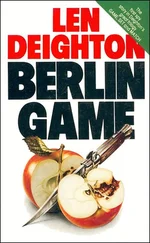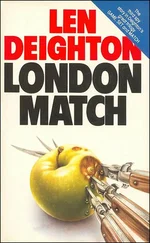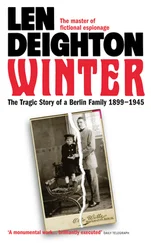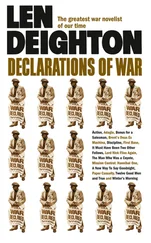Len Deighton - XPD
Здесь есть возможность читать онлайн «Len Deighton - XPD» — ознакомительный отрывок электронной книги совершенно бесплатно, а после прочтения отрывка купить полную версию. В некоторых случаях можно слушать аудио, скачать через торрент в формате fb2 и присутствует краткое содержание. Жанр: Триллер, на английском языке. Описание произведения, (предисловие) а так же отзывы посетителей доступны на портале библиотеки ЛибКат.
- Название:XPD
- Автор:
- Жанр:
- Год:неизвестен
- ISBN:нет данных
- Рейтинг книги:4 / 5. Голосов: 1
-
Избранное:Добавить в избранное
- Отзывы:
-
Ваша оценка:
- 80
- 1
- 2
- 3
- 4
- 5
XPD: краткое содержание, описание и аннотация
Предлагаем к чтению аннотацию, описание, краткое содержание или предисловие (зависит от того, что написал сам автор книги «XPD»). Если вы не нашли необходимую информацию о книге — напишите в комментариях, мы постараемся отыскать её.
XPD — читать онлайн ознакомительный отрывок
Ниже представлен текст книги, разбитый по страницам. Система сохранения места последней прочитанной страницы, позволяет с удобством читать онлайн бесплатно книгу «XPD», без необходимости каждый раз заново искать на чём Вы остановились. Поставьте закладку, и сможете в любой момент перейти на страницу, на которой закончили чтение.
Интервал:
Закладка:
‘What happened on Sunday?’
‘It began very warm. I went past the church and saw four army officers kneeling in prayer. They were offering prayers for peace, they said. Hitler’s driver brought the big black three-axle Mercedes tourer up through the trees. Its roof was folded back, as it was for the big parades. The Führer drove to Schloss Acoz, near Charleroi, Belgium. I was one of the security detail that accompanied him.’
‘Schloss Acoz?’
‘To meet the young colonel who’d been with Churchill. He’d come to withdraw Churchill’s offer. He was a tall fellow, much taller than the Spanish staff officer who was with him. Spain was neutral of course. The Spanish officer came along to guarantee the safety of the Englishman. They were both in civilian clothes. The meeting took place in the open. There were just the three of them standing under the trees, the sun dappling the ground and making patches on the men as they shifted positions. Hitler was stiff. We saw his face tighten. We all knew that was a danger sign. The English colonel spoke first. He went on talking for two or three minutes. He had no notes to refer to but it was obviously a prepared message that he had committed to memory. Then Hitler asked some questions and there was a general conversation. The Spanish general said very little; he was there just to conduct the Englishman and be responsible for his safety.’
‘No one made a record of that conversation?’
‘We were all out of earshot.’
‘So what went wrong?’
‘Within forty-eight hours of the Churchill-Hitler conference our army had occupied Paris. By that Friday lunch-time Hitler was drafting tougher terms. And Churchill had talked with Roosevelt on the trans-Atlantic telephone. Roosevelt told him that if he was re-elected in November the USA would come into the war.’
‘How do you know that?’
“The Research Bureau of the Reichspost monitored the transatlantic telephone; it was a radio link with a very simple scrambling device. Roosevelt promised aid and that was enough to change Churchill’s mind. Hitler had the transcript within three hours. He knew what the answer was going to be.’ Kleiber scratched his nose. ‘Churchill phoned the French premier the night before he dispatched his courier. The French reacted immediately. On that same Sunday that the Führer went to Schloss Acoz, the French government resigned. Marshal Pétain took over and asked for peace. Churchill went on the BBC that Monday night and made a speech saying, that, “… we shall fight on unconquerable, until the curse of Hitler is removed from the brows of men.” By Friday, Hitler was sitting in Foch’s chair in the railway coach and hearing the peace terms that the French would have to accept.’
‘What about the Englishman who brought the message to Hitler?’
‘He returned with the Spanish general,’ said Kleiber.
‘I mean in respect of Operation Siegfried. Surely he’s another one who knows the secrets?’
‘He’s dead,’ said Kleiber. ‘He was one of the first people we had to check out. He must have been completely in Churchill’s confidence. He probably knew more about those secret meetings than any man, except for Hitler and Churchill. We ran a check on him some years ago. His name was Elliot Castelbridge, from the Coldstream Guards. He was awarded the DSO fighting in Italy, partially deafened by a shell burst at Cassino. He got another medal in northern Europe in 1944. I can’t remember the rest of it. We got the whole dossier through the British War Office. We know everything about Elliot Castelbridge.’
‘You say he’s dead?’
‘Long since dead,’ said Kleiber. ‘Died on the operating table after a motor car accident in 1959. Your people are thorough, I must say that for them. They had every last detail of that man’s life on paper. Death certificate, report by the operating surgeon, statements by the hospital registrar, blood transfusions, X-rays. Everything you could ever wish for in an investigation.’
‘Yes, they are thorough,’ said Stuart. That was truly an XPD, he thought. He heard the first of the cars arriving from Langley.
Stuart reached out suddenly to grab the front of Kleiber’s jacket. ‘Where is it, Kleiber?’ He banged him back against the wall with enough force to make the thin partition wall shake. ‘You came here to give it to Grechko. Grechko is dead; give it to me.’ The sound echoed. ‘Give it to me!’ Stuart slapped him. Kleiber’s head hit the plasterboard wall again, and a large table lamp fell to the floor and broke. Kleiber shook his head slowly and blinked; his eyes watered with pain and surprise. Boyd Stuart said softly, ‘Give me the photo Franz Wever sent to you general delivery in Los Angeles.’
Slowly Kleiber unbuckled his belt and slid it through the loops of his trousers. He unzipped the inside of the belt to open the money compartment and took out a very tattered snapshot and a single-frame 35-mm negative.
‘How did you know?’
‘You collected the cameras; you just told me so. You were in a unique position to get a photo of Hitler and Churchill shaking hands.’ Stuart smoothed the photo to look at it. ‘And you could hide in a good spot to get the picture, concealment would be expected of a security guard.’
Kleiber nodded.
It was a blurred photo; Hitler squinting into the light, Churchill-cigar in mouth-frowning as if perplexed. But the two men had grasped hands firmly in an unmistakable gesture of solidarity.
‘Now what?’ Kleiber asked. He wiped his face with his handkerchief, watching Stuart warily and still surprised that his guess about the Scotsman’s violent nature was so soon confirmed.
Stuart had discovered everything he wanted to know. Already he had begun to decide how much of it should go into his report to Sir Sydney Ryden. He looked at his watch and wondered if the cashier would complain if he went Concorde.
‘Now, what? Now nothing, Kleiber.’ The man was a repugnant creature but that made his job only marginally more bearable.
Stuart patted his pockets as if searching for cigarettes. He felt the box inside which the hypodermic was wrapped in cotton gauze, with a spare phial inside his silver cigarette case where it was not likely to be broken. He hated these XPD jobs that the laboratory experts arranged. It was horrible enough to dispose of men with gun, blade or explosive but these toxic chemicals were loathsome.
‘I’m sorry, Kleiber,’ he said. ‘But it’s the end of the story.’
‘I’m a soldier,’ said Kleiber. It was almost as if he welcomed the chance to die like a hero.
Len Deighton

Len Deighton was born in London in 1929. He worked as a railway clerk before doing his National Service in the RAF as a photographer attached to the Special Investigation Branch.
After his discharge in 1949, he went to art school – first to the St Martin's School of Art, and then to the Royal College of Art on a scholarship. It was while working as a waiter in the evenings that he developed an interest in cookery – a subject he was later to make his own in an animated strip for the Observer and in two cookery books. He worked for a while as an illustrator in New York and as art director of an advertising agency in London.
Deciding it was time to settle down, Deighton moved to the Dordogne where he started work on his first book, The Ipcress File. Published in 1962 , the book was an immediate and spectacular success. Since then he has published twenty books of fiction and non-fiction – including spy stories, and highly-researched war novels and histories – all of which have appeared to international acclaim.
Читать дальшеИнтервал:
Закладка:
Похожие книги на «XPD»
Представляем Вашему вниманию похожие книги на «XPD» списком для выбора. Мы отобрали схожую по названию и смыслу литературу в надежде предоставить читателям больше вариантов отыскать новые, интересные, ещё непрочитанные произведения.
Обсуждение, отзывы о книге «XPD» и просто собственные мнения читателей. Оставьте ваши комментарии, напишите, что Вы думаете о произведении, его смысле или главных героях. Укажите что конкретно понравилось, а что нет, и почему Вы так считаете.












